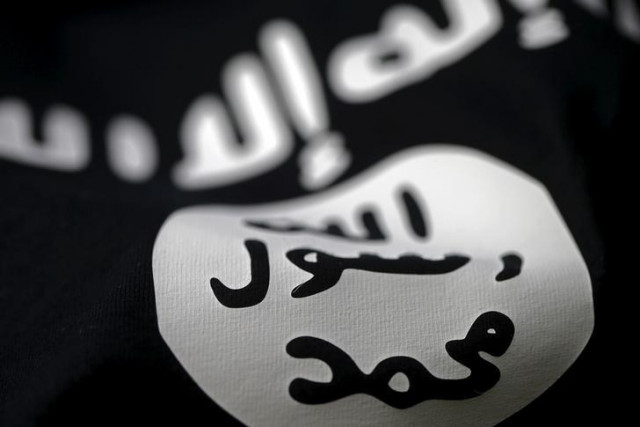IS denial in Pakistan
The Pakistani leadership should remind the US leadership that the IS is an American creation

PHOTO: REUTERS
Students of Jamia Hafsa sent a video message to the leadership of IS in the Middle East to wage a war against the state of Pakistan to avenge the 2007 military raid on Lal Masjid. Recently, an IS flag appeared on a major thoroughfare in Islamabad with the text “Khilafat is coming.” In January 2015, Yousuf al Salafi was arrested in Lahore who confessed to working for the IS in Pakistan. He revealed how he recruited people in Pakistan to fight alongside the IS in Syria, charging $600 per person. The funds he received were routed through the US. Disgruntled Taliban commanders have joined the Khorasan chapter of the IS. Other accounts of banners, pamphlets and flags have occurred in several Pakistani cities.
Trump to 'cut all military aid to Pakistan', thinks Washington is being 'ripped off' by Islamabad: report
The US advocates the presence of IS in Pakistan. General John Nicholson, the top US commander who commands US and Nato troops in Afghanistan, claimed that 70% of Da’ish fighters are from the Tehreek-e-Taliban Pakistan (TTP) after they were driven out of Pakistan in the Zarb-e-Azb operation. The Pakistani leadership either denied or reluctantly agreed that the IS is indeed present in Pakistan. It is a wasted opportunity in my view.
If common sense was really common, the Pakistani leadership would have jumped on the opportunity and advocated strongly for the presence of Da’ish in Pakistan. Let us briefly revisit how Da’ish was created. Before the US invasion of Iraq, the Jordanian militant Abu Musab al Zarqawi had been asking, literally begging Osama bin Laden for funds to support his jihadist organisation in Iraq. Bin Laden refused. Zarqawi was a nobody in the jihadist world. Then came Colin Powell’s UN speech, where he mentioned the name Abu Musab al Zarqawi 21 times to establish the link between al Qaeda and Iraq to justify the US invasion. Almost overnight, Zarqawi was elevated to stardom in the jihadist world.
Zarqawi later aligned his militant group Jama’at al-Tawhid w’al-Jihad with al Qaeda and formed the al Qaeda in Iraq (AQI), primarily a sectarian violent group. He was killed in a US drone strike in 2006. His successors rebranded AQI to the IS. Its reclusive leader, Abu Bakr al Baghdadi, spent 10 months in the largest American prison in Iraq, Camp Bucca, for some unknown crime, along with 12 top leaders of the IS. That prison served as an incubator for the IS and its leadership. The IS was born in Camp Bucca. Cells organised within the prison along with ousted Arab nationalist Ba’ath Party members making some of the IS ranks. Upon being released, al Baghdadi said to the guard on duty, “I’ll see you guys in New York.”

The Pakistani leadership should remind the US leadership that the IS is an American creation. By that I don’t mean the conspiracy theory that says America and Israel created the IS for their hegemonic aims in the Middle East. But rather that America is behind the creation of IS in that it created the conditions for the birth and spread of this ideology by supporting radical Islam for decades and especially, because of the invasion of Iraq. Pakistan can claim to be a victim of this violent ideology rather than feeling embarrassed for its presence in the country. All they need to do is concede to the US claims that the IS is present in Pakistan.
It is reminiscent of the computers in the late ’90s, when antivirus software had to be installed to prevent PCs from getting infected with viruses. It was believed, and this may not be true, that the companies selling antivirus software are the ones spreading those viruses to create the need for their software. America complains over the presence of IS virus in Pakistan when really the virus is made in America. More disturbingly, American leadership wants to militarily defeat the virus. While antivirus software actually worked, such a Whack-A-Mole strategy is doomed to fail because it created the virus in the first place and will multiply it further.
How strong is Islamic State in Pakistan?
Most importantly, the Pakistani leadership can remind the American leadership that since 70% of IS fighters are from the TTP as claimed by the top US commander, that implicates India because the link between the TTP and RAW is a fact no more confined to the intelligence circles only. It is out in the public after an Indian analyst, Bharat Karnad, wrote about it in The Hindustan Times. The TTP has been behind devastating terror attacks inside Pakistan while it was supported by RAW. The IS is the new TTP in Pakistan. All the more reason for Pakistan to accept the US position on IS presence in the country.
The American leadership should direct their opprobrium at RAW since the TTP is now working under the banner of IS. The more urgent aim seems to be finding any loose ends so as to criticise Pakistan rather than the elimination of terror in this region of which India is a sponsor. But as I wrote a couple of weeks ago, Pakistan has to make noise — because noise, not actions, speaks louder.
Published in The Express Tribune, October 7th, 2017.
Like Opinion & Editorial on Facebook, follow @ETOpEd on Twitter to receive all updates on all our daily pieces.














COMMENTS
Comments are moderated and generally will be posted if they are on-topic and not abusive.
For more information, please see our Comments FAQ